Exploring Emotional Intelligence as a Key to Authentic Leadership
VerifiedAdded on 2023/06/11
|9
|2788
|297
Report
AI Summary
This report examines the critical role of emotional intelligence as a prerequisite for authentic leadership. It defines leadership as the ability to guide others towards organizational goals, highlighting the importance of balancing communication, emotional intelligence, and interpersonal skills. Emotional intelligence, characterized by self-awareness, self-management, social awareness, and relationship management, is presented as a key factor in inspiring and guiding others. The report also discusses authentic leadership, emphasizing self-awareness, emotional control, and alignment of values. It further explores the benefits of emotional intelligence in leadership, such as fostering a positive workplace, effective decision-making, and conflict resolution, while referencing Daniel Goleman's four elements of emotional intelligence: self-awareness, self-management, social awareness, and social skills. The conclusion emphasizes the importance of emotional intelligence in enhancing leadership abilities and creating a positive organizational culture.
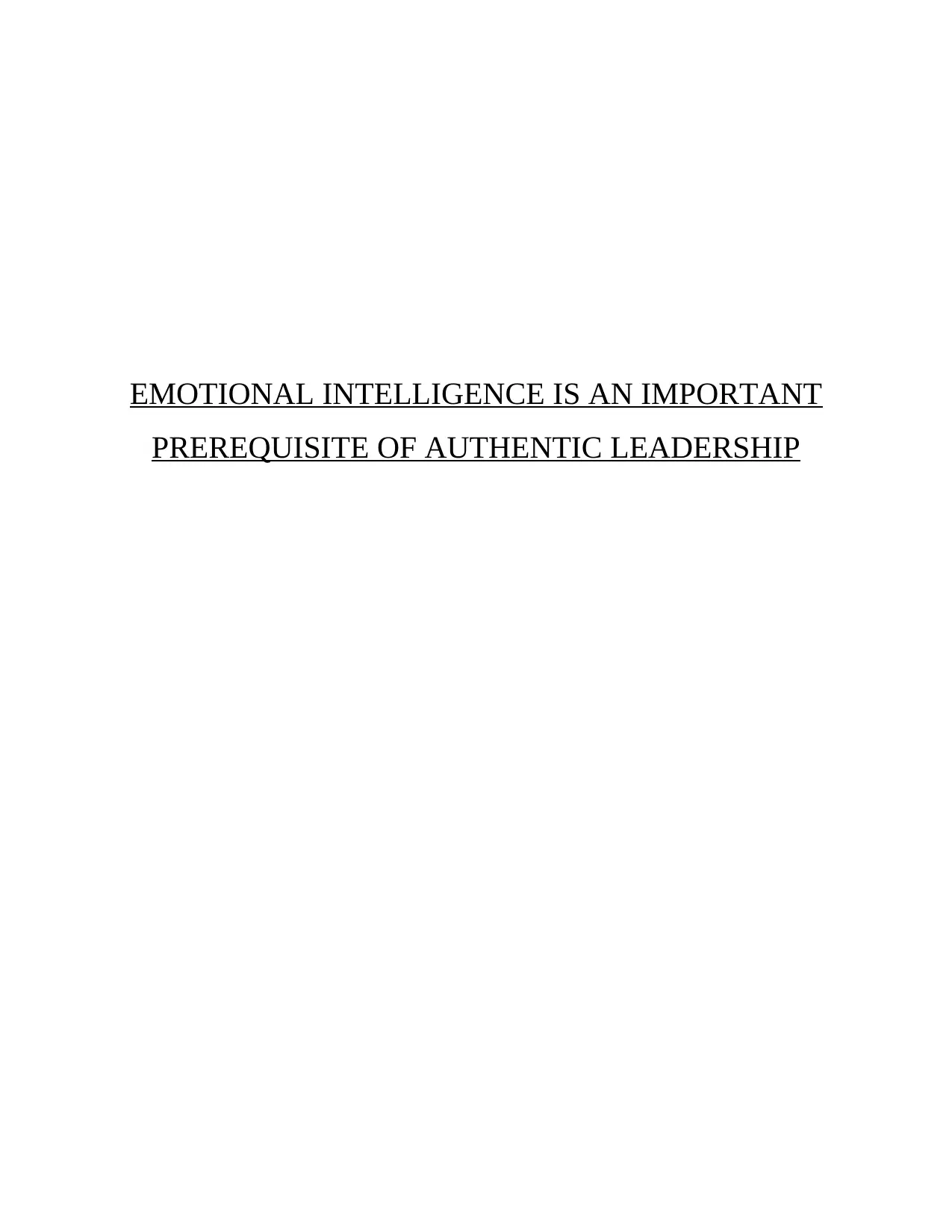
EMOTIONAL INTELLIGENCE IS AN IMPORTANT
PREREQUISITE OF AUTHENTIC LEADERSHIP
PREREQUISITE OF AUTHENTIC LEADERSHIP
Paraphrase This Document
Need a fresh take? Get an instant paraphrase of this document with our AI Paraphraser
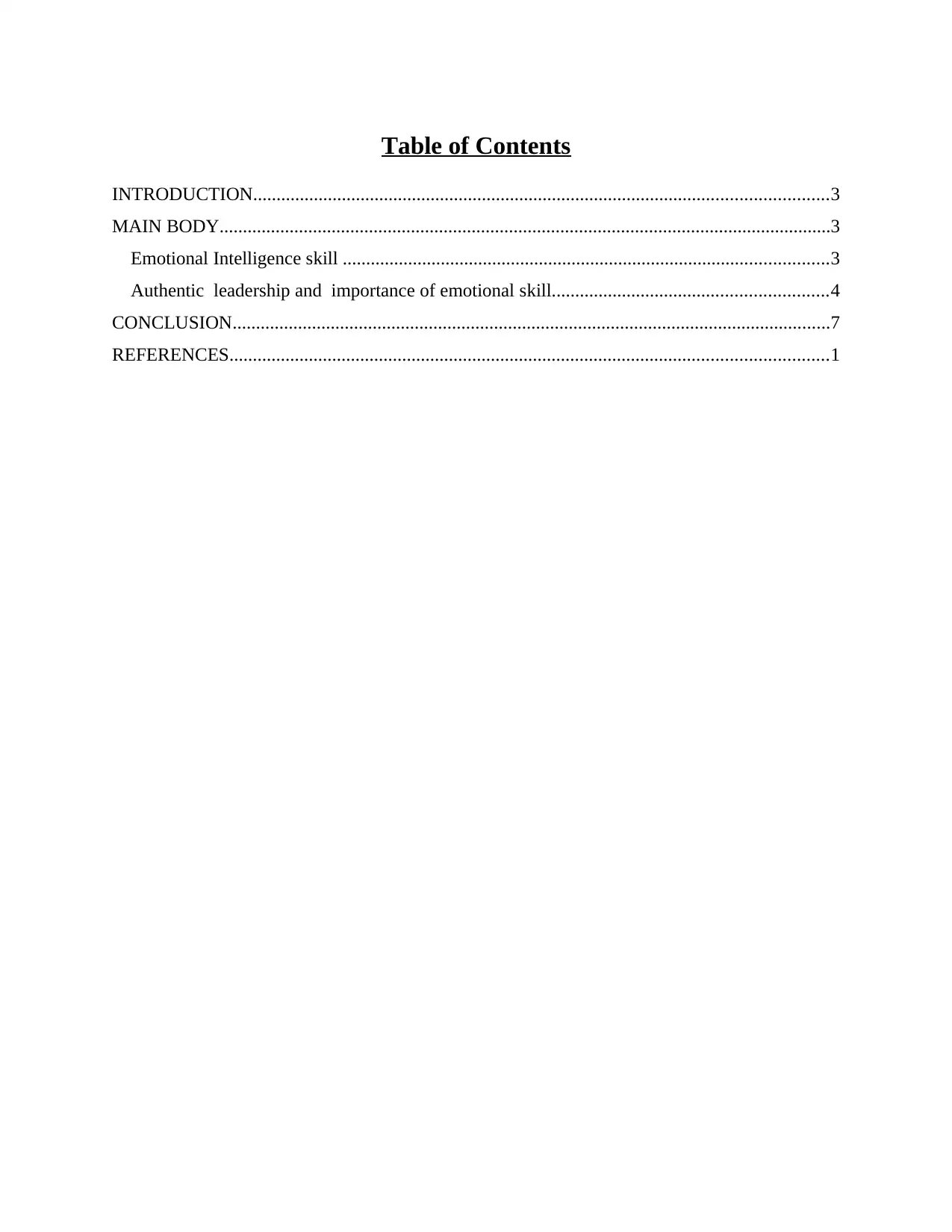
Table of Contents
INTRODUCTION...........................................................................................................................3
MAIN BODY...................................................................................................................................3
Emotional Intelligence skill ........................................................................................................3
Authentic leadership and importance of emotional skill...........................................................4
CONCLUSION................................................................................................................................7
REFERENCES................................................................................................................................1
INTRODUCTION...........................................................................................................................3
MAIN BODY...................................................................................................................................3
Emotional Intelligence skill ........................................................................................................3
Authentic leadership and importance of emotional skill...........................................................4
CONCLUSION................................................................................................................................7
REFERENCES................................................................................................................................1
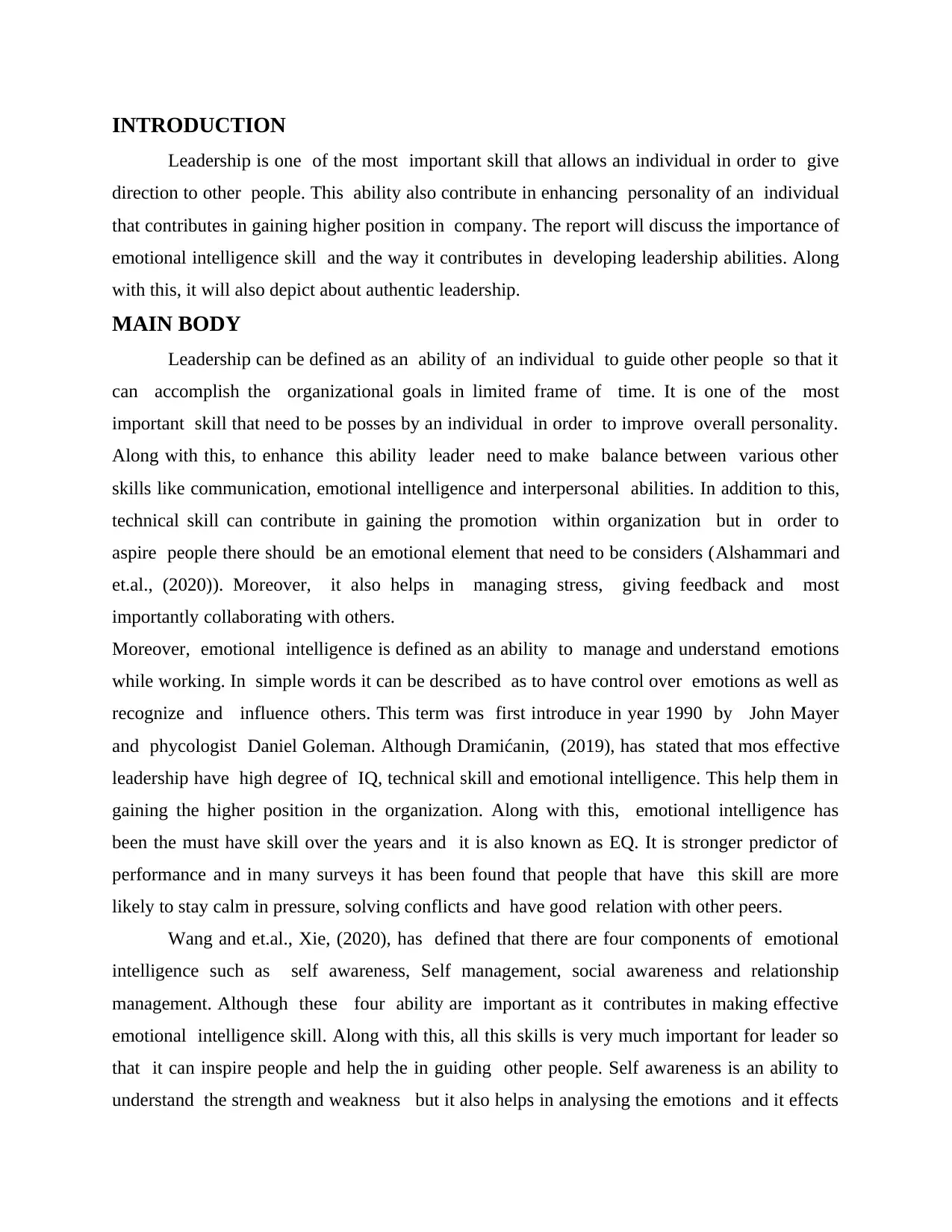
INTRODUCTION
Leadership is one of the most important skill that allows an individual in order to give
direction to other people. This ability also contribute in enhancing personality of an individual
that contributes in gaining higher position in company. The report will discuss the importance of
emotional intelligence skill and the way it contributes in developing leadership abilities. Along
with this, it will also depict about authentic leadership.
MAIN BODY
Leadership can be defined as an ability of an individual to guide other people so that it
can accomplish the organizational goals in limited frame of time. It is one of the most
important skill that need to be posses by an individual in order to improve overall personality.
Along with this, to enhance this ability leader need to make balance between various other
skills like communication, emotional intelligence and interpersonal abilities. In addition to this,
technical skill can contribute in gaining the promotion within organization but in order to
aspire people there should be an emotional element that need to be considers (Alshammari and
et.al., (2020)). Moreover, it also helps in managing stress, giving feedback and most
importantly collaborating with others.
Moreover, emotional intelligence is defined as an ability to manage and understand emotions
while working. In simple words it can be described as to have control over emotions as well as
recognize and influence others. This term was first introduce in year 1990 by John Mayer
and phycologist Daniel Goleman. Although Dramićanin, (2019), has stated that mos effective
leadership have high degree of IQ, technical skill and emotional intelligence. This help them in
gaining the higher position in the organization. Along with this, emotional intelligence has
been the must have skill over the years and it is also known as EQ. It is stronger predictor of
performance and in many surveys it has been found that people that have this skill are more
likely to stay calm in pressure, solving conflicts and have good relation with other peers.
Wang and et.al., Xie, (2020), has defined that there are four components of emotional
intelligence such as self awareness, Self management, social awareness and relationship
management. Although these four ability are important as it contributes in making effective
emotional intelligence skill. Along with this, all this skills is very much important for leader so
that it can inspire people and help the in guiding other people. Self awareness is an ability to
understand the strength and weakness but it also helps in analysing the emotions and it effects
Leadership is one of the most important skill that allows an individual in order to give
direction to other people. This ability also contribute in enhancing personality of an individual
that contributes in gaining higher position in company. The report will discuss the importance of
emotional intelligence skill and the way it contributes in developing leadership abilities. Along
with this, it will also depict about authentic leadership.
MAIN BODY
Leadership can be defined as an ability of an individual to guide other people so that it
can accomplish the organizational goals in limited frame of time. It is one of the most
important skill that need to be posses by an individual in order to improve overall personality.
Along with this, to enhance this ability leader need to make balance between various other
skills like communication, emotional intelligence and interpersonal abilities. In addition to this,
technical skill can contribute in gaining the promotion within organization but in order to
aspire people there should be an emotional element that need to be considers (Alshammari and
et.al., (2020)). Moreover, it also helps in managing stress, giving feedback and most
importantly collaborating with others.
Moreover, emotional intelligence is defined as an ability to manage and understand emotions
while working. In simple words it can be described as to have control over emotions as well as
recognize and influence others. This term was first introduce in year 1990 by John Mayer
and phycologist Daniel Goleman. Although Dramićanin, (2019), has stated that mos effective
leadership have high degree of IQ, technical skill and emotional intelligence. This help them in
gaining the higher position in the organization. Along with this, emotional intelligence has
been the must have skill over the years and it is also known as EQ. It is stronger predictor of
performance and in many surveys it has been found that people that have this skill are more
likely to stay calm in pressure, solving conflicts and have good relation with other peers.
Wang and et.al., Xie, (2020), has defined that there are four components of emotional
intelligence such as self awareness, Self management, social awareness and relationship
management. Although these four ability are important as it contributes in making effective
emotional intelligence skill. Along with this, all this skills is very much important for leader so
that it can inspire people and help the in guiding other people. Self awareness is an ability to
understand the strength and weakness but it also helps in analysing the emotions and it effects
⊘ This is a preview!⊘
Do you want full access?
Subscribe today to unlock all pages.

Trusted by 1+ million students worldwide
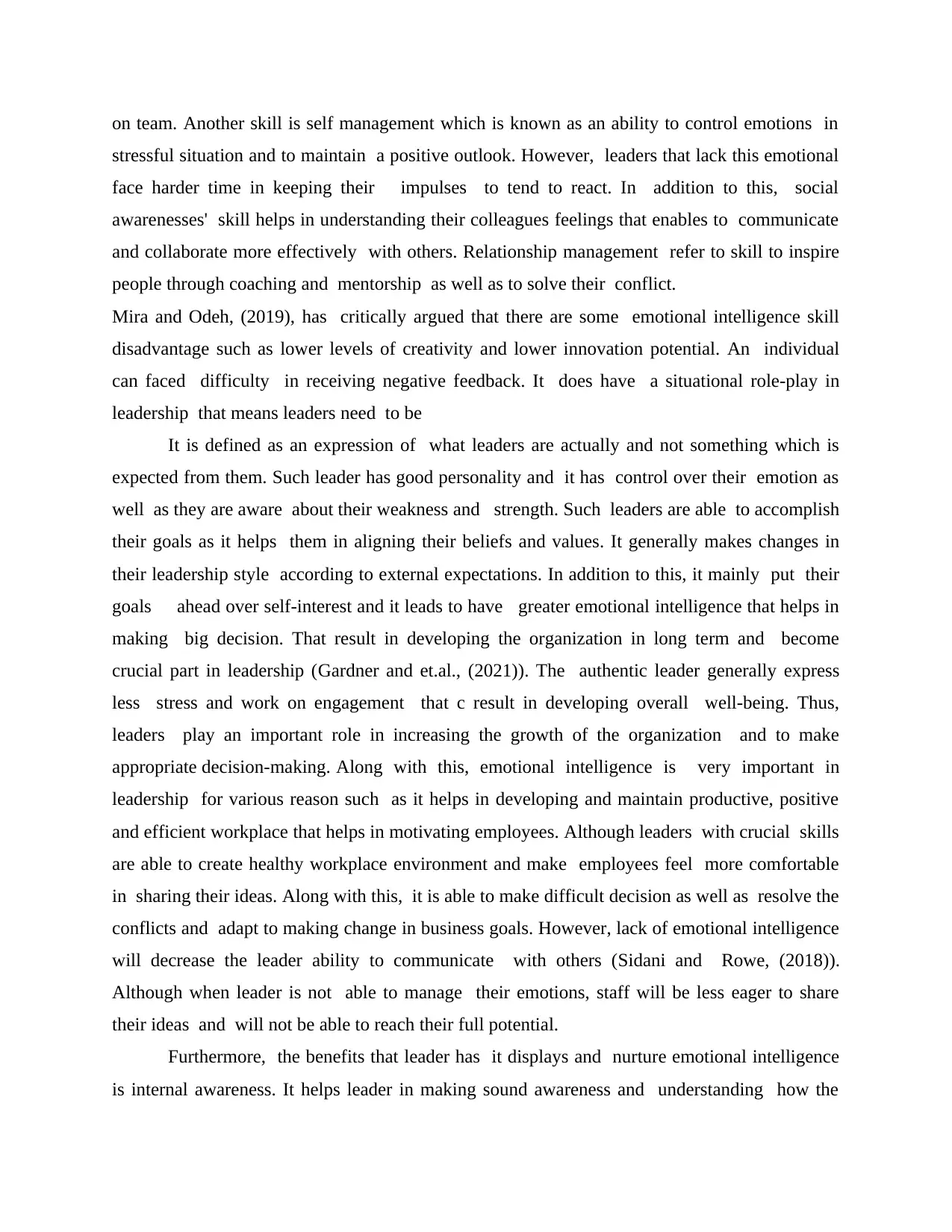
on team. Another skill is self management which is known as an ability to control emotions in
stressful situation and to maintain a positive outlook. However, leaders that lack this emotional
face harder time in keeping their impulses to tend to react. In addition to this, social
awarenesses' skill helps in understanding their colleagues feelings that enables to communicate
and collaborate more effectively with others. Relationship management refer to skill to inspire
people through coaching and mentorship as well as to solve their conflict.
Mira and Odeh, (2019), has critically argued that there are some emotional intelligence skill
disadvantage such as lower levels of creativity and lower innovation potential. An individual
can faced difficulty in receiving negative feedback. It does have a situational role-play in
leadership that means leaders need to be
It is defined as an expression of what leaders are actually and not something which is
expected from them. Such leader has good personality and it has control over their emotion as
well as they are aware about their weakness and strength. Such leaders are able to accomplish
their goals as it helps them in aligning their beliefs and values. It generally makes changes in
their leadership style according to external expectations. In addition to this, it mainly put their
goals ahead over self-interest and it leads to have greater emotional intelligence that helps in
making big decision. That result in developing the organization in long term and become
crucial part in leadership (Gardner and et.al., (2021)). The authentic leader generally express
less stress and work on engagement that c result in developing overall well-being. Thus,
leaders play an important role in increasing the growth of the organization and to make
appropriate decision-making. Along with this, emotional intelligence is very important in
leadership for various reason such as it helps in developing and maintain productive, positive
and efficient workplace that helps in motivating employees. Although leaders with crucial skills
are able to create healthy workplace environment and make employees feel more comfortable
in sharing their ideas. Along with this, it is able to make difficult decision as well as resolve the
conflicts and adapt to making change in business goals. However, lack of emotional intelligence
will decrease the leader ability to communicate with others (Sidani and Rowe, (2018)).
Although when leader is not able to manage their emotions, staff will be less eager to share
their ideas and will not be able to reach their full potential.
Furthermore, the benefits that leader has it displays and nurture emotional intelligence
is internal awareness. It helps leader in making sound awareness and understanding how the
stressful situation and to maintain a positive outlook. However, leaders that lack this emotional
face harder time in keeping their impulses to tend to react. In addition to this, social
awarenesses' skill helps in understanding their colleagues feelings that enables to communicate
and collaborate more effectively with others. Relationship management refer to skill to inspire
people through coaching and mentorship as well as to solve their conflict.
Mira and Odeh, (2019), has critically argued that there are some emotional intelligence skill
disadvantage such as lower levels of creativity and lower innovation potential. An individual
can faced difficulty in receiving negative feedback. It does have a situational role-play in
leadership that means leaders need to be
It is defined as an expression of what leaders are actually and not something which is
expected from them. Such leader has good personality and it has control over their emotion as
well as they are aware about their weakness and strength. Such leaders are able to accomplish
their goals as it helps them in aligning their beliefs and values. It generally makes changes in
their leadership style according to external expectations. In addition to this, it mainly put their
goals ahead over self-interest and it leads to have greater emotional intelligence that helps in
making big decision. That result in developing the organization in long term and become
crucial part in leadership (Gardner and et.al., (2021)). The authentic leader generally express
less stress and work on engagement that c result in developing overall well-being. Thus,
leaders play an important role in increasing the growth of the organization and to make
appropriate decision-making. Along with this, emotional intelligence is very important in
leadership for various reason such as it helps in developing and maintain productive, positive
and efficient workplace that helps in motivating employees. Although leaders with crucial skills
are able to create healthy workplace environment and make employees feel more comfortable
in sharing their ideas. Along with this, it is able to make difficult decision as well as resolve the
conflicts and adapt to making change in business goals. However, lack of emotional intelligence
will decrease the leader ability to communicate with others (Sidani and Rowe, (2018)).
Although when leader is not able to manage their emotions, staff will be less eager to share
their ideas and will not be able to reach their full potential.
Furthermore, the benefits that leader has it displays and nurture emotional intelligence
is internal awareness. It helps leader in making sound awareness and understanding how the
Paraphrase This Document
Need a fresh take? Get an instant paraphrase of this document with our AI Paraphraser
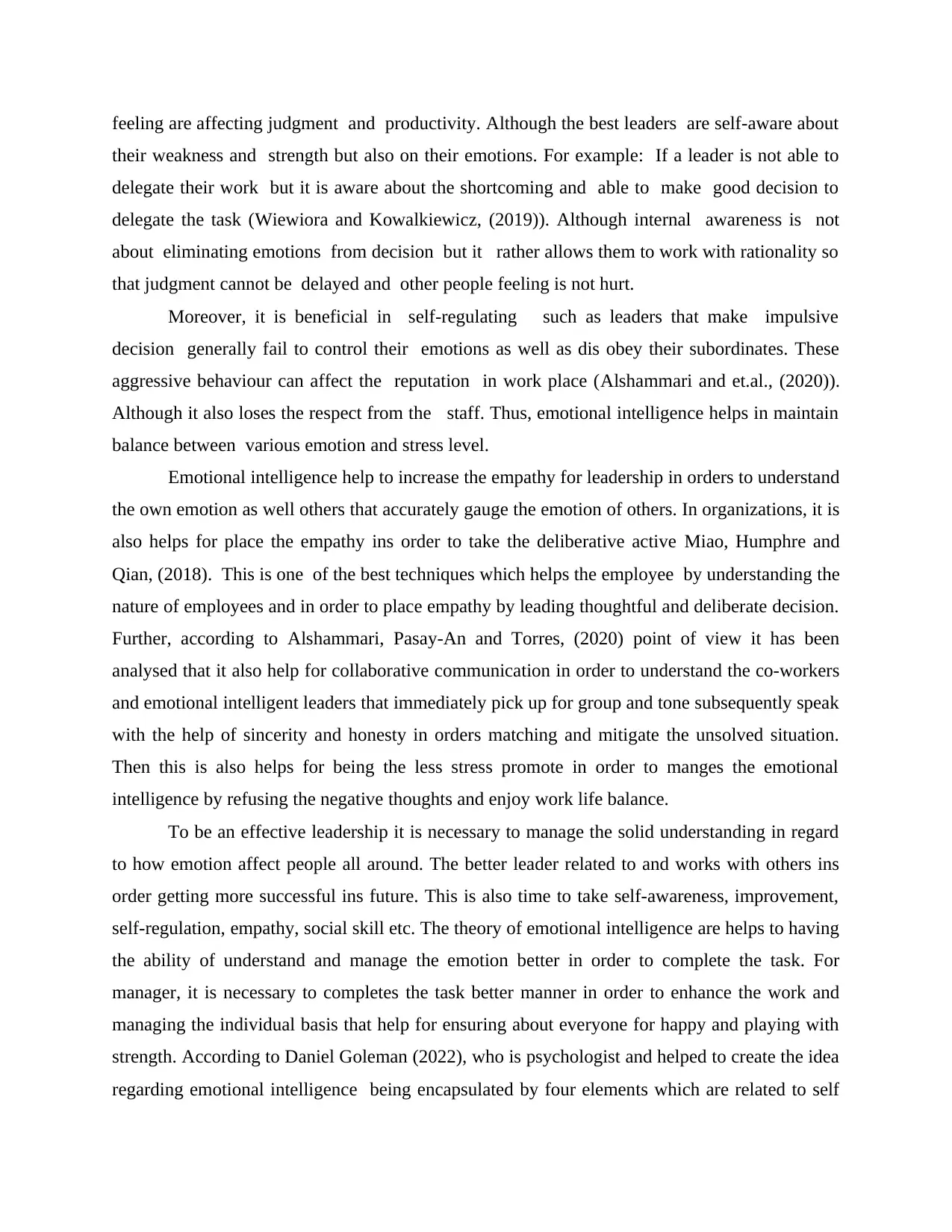
feeling are affecting judgment and productivity. Although the best leaders are self-aware about
their weakness and strength but also on their emotions. For example: If a leader is not able to
delegate their work but it is aware about the shortcoming and able to make good decision to
delegate the task (Wiewiora and Kowalkiewicz, (2019)). Although internal awareness is not
about eliminating emotions from decision but it rather allows them to work with rationality so
that judgment cannot be delayed and other people feeling is not hurt.
Moreover, it is beneficial in self-regulating such as leaders that make impulsive
decision generally fail to control their emotions as well as dis obey their subordinates. These
aggressive behaviour can affect the reputation in work place (Alshammari and et.al., (2020)).
Although it also loses the respect from the staff. Thus, emotional intelligence helps in maintain
balance between various emotion and stress level.
Emotional intelligence help to increase the empathy for leadership in orders to understand
the own emotion as well others that accurately gauge the emotion of others. In organizations, it is
also helps for place the empathy ins order to take the deliberative active Miao, Humphre and
Qian, (2018). This is one of the best techniques which helps the employee by understanding the
nature of employees and in order to place empathy by leading thoughtful and deliberate decision.
Further, according to Alshammari, Pasay-An and Torres, (2020) point of view it has been
analysed that it also help for collaborative communication in order to understand the co-workers
and emotional intelligent leaders that immediately pick up for group and tone subsequently speak
with the help of sincerity and honesty in orders matching and mitigate the unsolved situation.
Then this is also helps for being the less stress promote in order to manges the emotional
intelligence by refusing the negative thoughts and enjoy work life balance.
To be an effective leadership it is necessary to manage the solid understanding in regard
to how emotion affect people all around. The better leader related to and works with others ins
order getting more successful ins future. This is also time to take self-awareness, improvement,
self-regulation, empathy, social skill etc. The theory of emotional intelligence are helps to having
the ability of understand and manage the emotion better in order to complete the task. For
manager, it is necessary to completes the task better manner in order to enhance the work and
managing the individual basis that help for ensuring about everyone for happy and playing with
strength. According to Daniel Goleman (2022), who is psychologist and helped to create the idea
regarding emotional intelligence being encapsulated by four elements which are related to self
their weakness and strength but also on their emotions. For example: If a leader is not able to
delegate their work but it is aware about the shortcoming and able to make good decision to
delegate the task (Wiewiora and Kowalkiewicz, (2019)). Although internal awareness is not
about eliminating emotions from decision but it rather allows them to work with rationality so
that judgment cannot be delayed and other people feeling is not hurt.
Moreover, it is beneficial in self-regulating such as leaders that make impulsive
decision generally fail to control their emotions as well as dis obey their subordinates. These
aggressive behaviour can affect the reputation in work place (Alshammari and et.al., (2020)).
Although it also loses the respect from the staff. Thus, emotional intelligence helps in maintain
balance between various emotion and stress level.
Emotional intelligence help to increase the empathy for leadership in orders to understand
the own emotion as well others that accurately gauge the emotion of others. In organizations, it is
also helps for place the empathy ins order to take the deliberative active Miao, Humphre and
Qian, (2018). This is one of the best techniques which helps the employee by understanding the
nature of employees and in order to place empathy by leading thoughtful and deliberate decision.
Further, according to Alshammari, Pasay-An and Torres, (2020) point of view it has been
analysed that it also help for collaborative communication in order to understand the co-workers
and emotional intelligent leaders that immediately pick up for group and tone subsequently speak
with the help of sincerity and honesty in orders matching and mitigate the unsolved situation.
Then this is also helps for being the less stress promote in order to manges the emotional
intelligence by refusing the negative thoughts and enjoy work life balance.
To be an effective leadership it is necessary to manage the solid understanding in regard
to how emotion affect people all around. The better leader related to and works with others ins
order getting more successful ins future. This is also time to take self-awareness, improvement,
self-regulation, empathy, social skill etc. The theory of emotional intelligence are helps to having
the ability of understand and manage the emotion better in order to complete the task. For
manager, it is necessary to completes the task better manner in order to enhance the work and
managing the individual basis that help for ensuring about everyone for happy and playing with
strength. According to Daniel Goleman (2022), who is psychologist and helped to create the idea
regarding emotional intelligence being encapsulated by four elements which are related to self
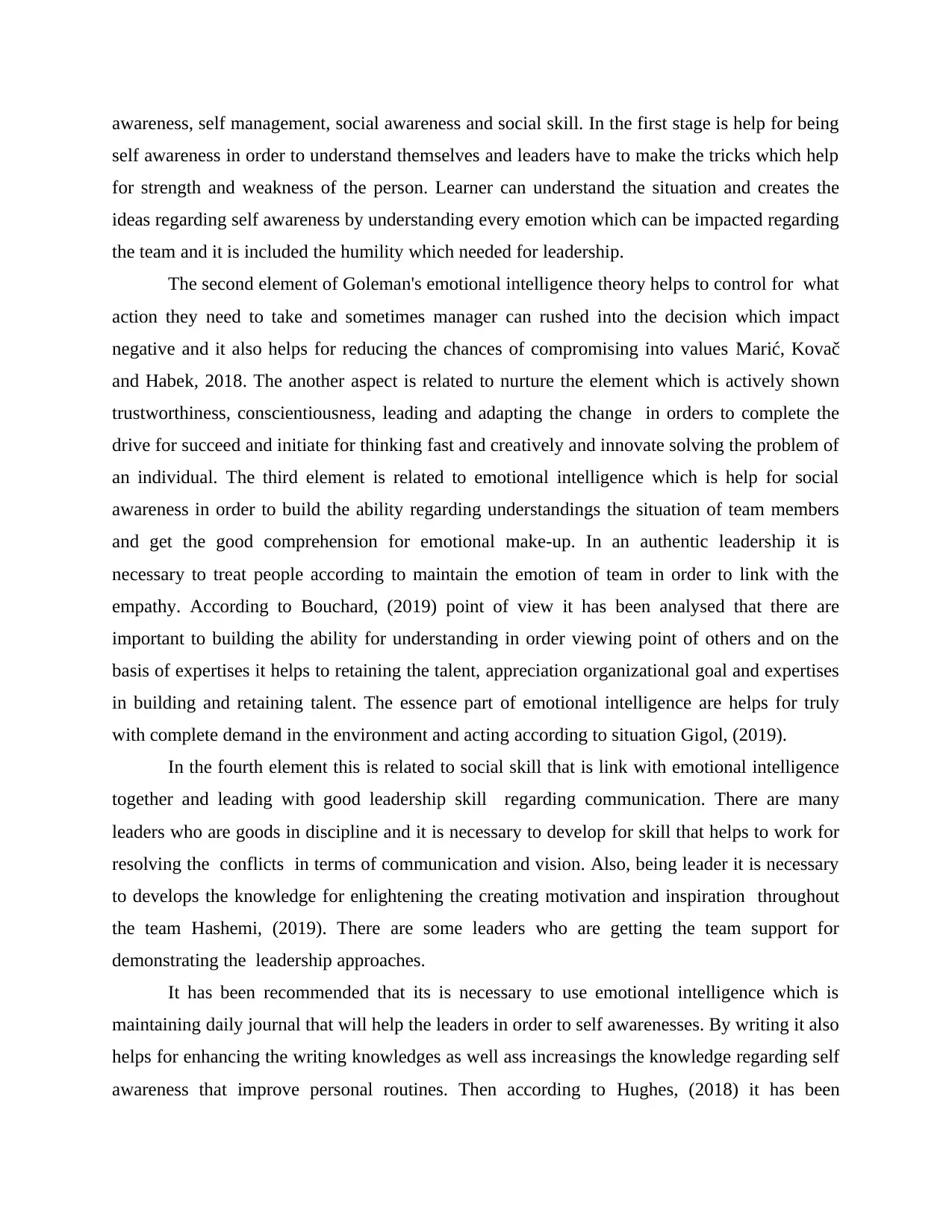
awareness, self management, social awareness and social skill. In the first stage is help for being
self awareness in order to understand themselves and leaders have to make the tricks which help
for strength and weakness of the person. Learner can understand the situation and creates the
ideas regarding self awareness by understanding every emotion which can be impacted regarding
the team and it is included the humility which needed for leadership.
The second element of Goleman's emotional intelligence theory helps to control for what
action they need to take and sometimes manager can rushed into the decision which impact
negative and it also helps for reducing the chances of compromising into values Marić, Kovač
and Habek, 2018. The another aspect is related to nurture the element which is actively shown
trustworthiness, conscientiousness, leading and adapting the change in orders to complete the
drive for succeed and initiate for thinking fast and creatively and innovate solving the problem of
an individual. The third element is related to emotional intelligence which is help for social
awareness in order to build the ability regarding understandings the situation of team members
and get the good comprehension for emotional make-up. In an authentic leadership it is
necessary to treat people according to maintain the emotion of team in order to link with the
empathy. According to Bouchard, (2019) point of view it has been analysed that there are
important to building the ability for understanding in order viewing point of others and on the
basis of expertises it helps to retaining the talent, appreciation organizational goal and expertises
in building and retaining talent. The essence part of emotional intelligence are helps for truly
with complete demand in the environment and acting according to situation Gigol, (2019).
In the fourth element this is related to social skill that is link with emotional intelligence
together and leading with good leadership skill regarding communication. There are many
leaders who are goods in discipline and it is necessary to develop for skill that helps to work for
resolving the conflicts in terms of communication and vision. Also, being leader it is necessary
to develops the knowledge for enlightening the creating motivation and inspiration throughout
the team Hashemi, (2019). There are some leaders who are getting the team support for
demonstrating the leadership approaches.
It has been recommended that its is necessary to use emotional intelligence which is
maintaining daily journal that will help the leaders in order to self awarenesses. By writing it also
helps for enhancing the writing knowledges as well ass increasings the knowledge regarding self
awareness that improve personal routines. Then according to Hughes, (2018) it has been
self awareness in order to understand themselves and leaders have to make the tricks which help
for strength and weakness of the person. Learner can understand the situation and creates the
ideas regarding self awareness by understanding every emotion which can be impacted regarding
the team and it is included the humility which needed for leadership.
The second element of Goleman's emotional intelligence theory helps to control for what
action they need to take and sometimes manager can rushed into the decision which impact
negative and it also helps for reducing the chances of compromising into values Marić, Kovač
and Habek, 2018. The another aspect is related to nurture the element which is actively shown
trustworthiness, conscientiousness, leading and adapting the change in orders to complete the
drive for succeed and initiate for thinking fast and creatively and innovate solving the problem of
an individual. The third element is related to emotional intelligence which is help for social
awareness in order to build the ability regarding understandings the situation of team members
and get the good comprehension for emotional make-up. In an authentic leadership it is
necessary to treat people according to maintain the emotion of team in order to link with the
empathy. According to Bouchard, (2019) point of view it has been analysed that there are
important to building the ability for understanding in order viewing point of others and on the
basis of expertises it helps to retaining the talent, appreciation organizational goal and expertises
in building and retaining talent. The essence part of emotional intelligence are helps for truly
with complete demand in the environment and acting according to situation Gigol, (2019).
In the fourth element this is related to social skill that is link with emotional intelligence
together and leading with good leadership skill regarding communication. There are many
leaders who are goods in discipline and it is necessary to develop for skill that helps to work for
resolving the conflicts in terms of communication and vision. Also, being leader it is necessary
to develops the knowledge for enlightening the creating motivation and inspiration throughout
the team Hashemi, (2019). There are some leaders who are getting the team support for
demonstrating the leadership approaches.
It has been recommended that its is necessary to use emotional intelligence which is
maintaining daily journal that will help the leaders in order to self awarenesses. By writing it also
helps for enhancing the writing knowledges as well ass increasings the knowledge regarding self
awareness that improve personal routines. Then according to Hughes, (2018) it has been
⊘ This is a preview!⊘
Do you want full access?
Subscribe today to unlock all pages.

Trusted by 1+ million students worldwide
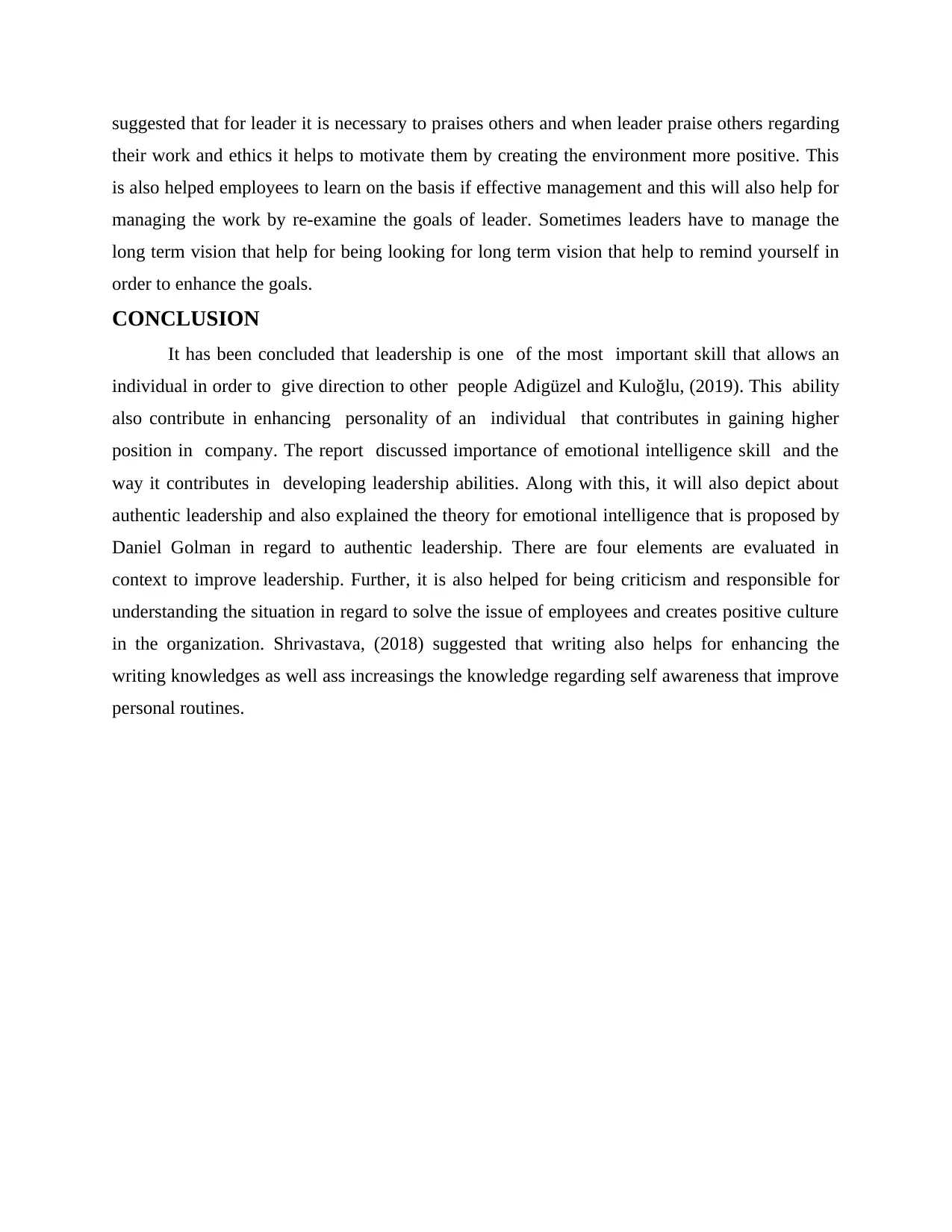
suggested that for leader it is necessary to praises others and when leader praise others regarding
their work and ethics it helps to motivate them by creating the environment more positive. This
is also helped employees to learn on the basis if effective management and this will also help for
managing the work by re-examine the goals of leader. Sometimes leaders have to manage the
long term vision that help for being looking for long term vision that help to remind yourself in
order to enhance the goals.
CONCLUSION
It has been concluded that leadership is one of the most important skill that allows an
individual in order to give direction to other people Adigüzel and Kuloğlu, (2019). This ability
also contribute in enhancing personality of an individual that contributes in gaining higher
position in company. The report discussed importance of emotional intelligence skill and the
way it contributes in developing leadership abilities. Along with this, it will also depict about
authentic leadership and also explained the theory for emotional intelligence that is proposed by
Daniel Golman in regard to authentic leadership. There are four elements are evaluated in
context to improve leadership. Further, it is also helped for being criticism and responsible for
understanding the situation in regard to solve the issue of employees and creates positive culture
in the organization. Shrivastava, (2018) suggested that writing also helps for enhancing the
writing knowledges as well ass increasings the knowledge regarding self awareness that improve
personal routines.
their work and ethics it helps to motivate them by creating the environment more positive. This
is also helped employees to learn on the basis if effective management and this will also help for
managing the work by re-examine the goals of leader. Sometimes leaders have to manage the
long term vision that help for being looking for long term vision that help to remind yourself in
order to enhance the goals.
CONCLUSION
It has been concluded that leadership is one of the most important skill that allows an
individual in order to give direction to other people Adigüzel and Kuloğlu, (2019). This ability
also contribute in enhancing personality of an individual that contributes in gaining higher
position in company. The report discussed importance of emotional intelligence skill and the
way it contributes in developing leadership abilities. Along with this, it will also depict about
authentic leadership and also explained the theory for emotional intelligence that is proposed by
Daniel Golman in regard to authentic leadership. There are four elements are evaluated in
context to improve leadership. Further, it is also helped for being criticism and responsible for
understanding the situation in regard to solve the issue of employees and creates positive culture
in the organization. Shrivastava, (2018) suggested that writing also helps for enhancing the
writing knowledges as well ass increasings the knowledge regarding self awareness that improve
personal routines.
Paraphrase This Document
Need a fresh take? Get an instant paraphrase of this document with our AI Paraphraser
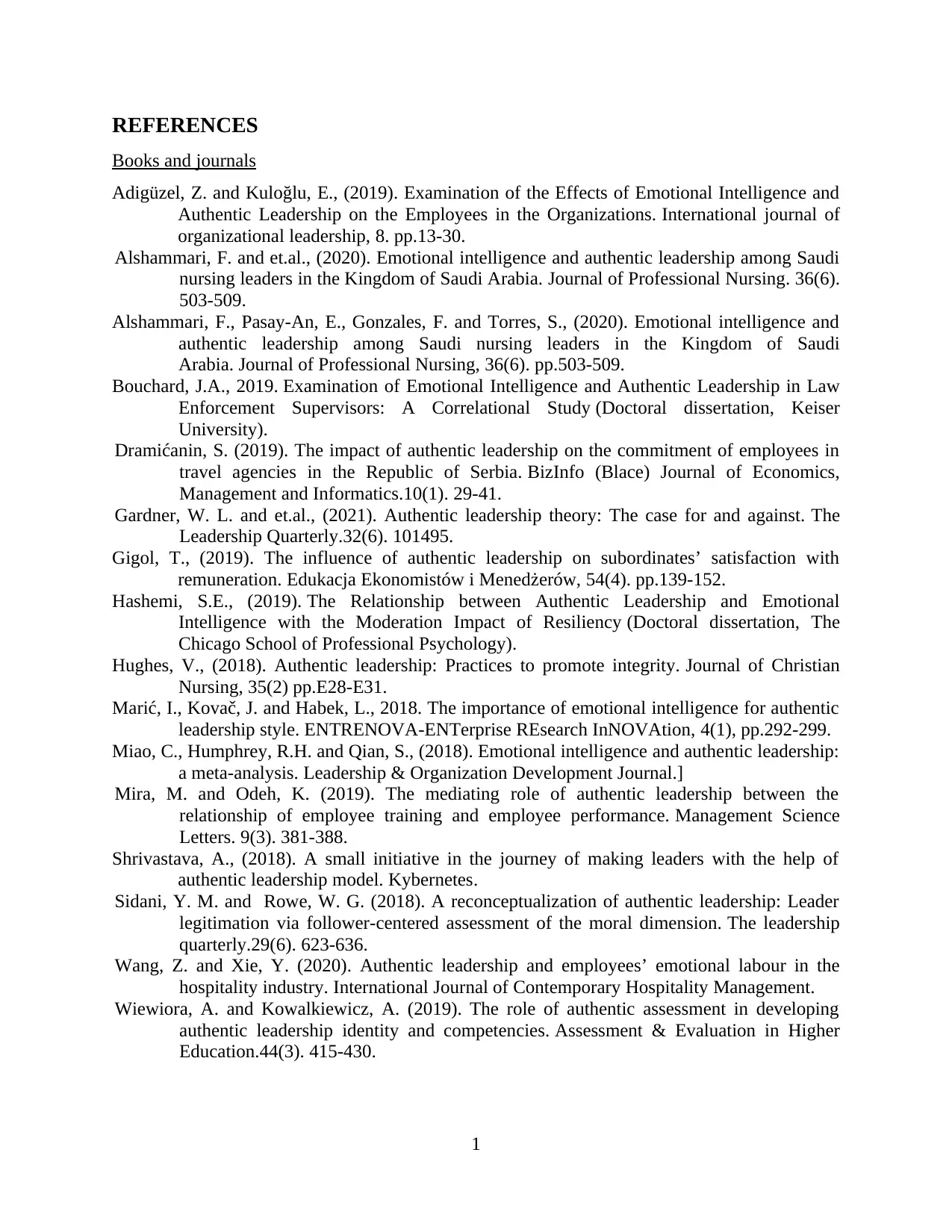
REFERENCES
Books and journals
Adigüzel, Z. and Kuloğlu, E., (2019). Examination of the Effects of Emotional Intelligence and
Authentic Leadership on the Employees in the Organizations. International journal of
organizational leadership, 8. pp.13-30.
Alshammari, F. and et.al., (2020). Emotional intelligence and authentic leadership among Saudi
nursing leaders in the Kingdom of Saudi Arabia. Journal of Professional Nursing. 36(6).
503-509.
Alshammari, F., Pasay-An, E., Gonzales, F. and Torres, S., (2020). Emotional intelligence and
authentic leadership among Saudi nursing leaders in the Kingdom of Saudi
Arabia. Journal of Professional Nursing, 36(6). pp.503-509.
Bouchard, J.A., 2019. Examination of Emotional Intelligence and Authentic Leadership in Law
Enforcement Supervisors: A Correlational Study (Doctoral dissertation, Keiser
University).
Dramićanin, S. (2019). The impact of authentic leadership on the commitment of employees in
travel agencies in the Republic of Serbia. BizInfo (Blace) Journal of Economics,
Management and Informatics.10(1). 29-41.
Gardner, W. L. and et.al., (2021). Authentic leadership theory: The case for and against. The
Leadership Quarterly.32(6). 101495.
Gigol, T., (2019). The influence of authentic leadership on subordinates’ satisfaction with
remuneration. Edukacja Ekonomistów i Menedżerów, 54(4). pp.139-152.
Hashemi, S.E., (2019). The Relationship between Authentic Leadership and Emotional
Intelligence with the Moderation Impact of Resiliency (Doctoral dissertation, The
Chicago School of Professional Psychology).
Hughes, V., (2018). Authentic leadership: Practices to promote integrity. Journal of Christian
Nursing, 35(2) pp.E28-E31.
Marić, I., Kovač, J. and Habek, L., 2018. The importance of emotional intelligence for authentic
leadership style. ENTRENOVA-ENTerprise REsearch InNOVAtion, 4(1), pp.292-299.
Miao, C., Humphrey, R.H. and Qian, S., (2018). Emotional intelligence and authentic leadership:
a meta-analysis. Leadership & Organization Development Journal.]
Mira, M. and Odeh, K. (2019). The mediating role of authentic leadership between the
relationship of employee training and employee performance. Management Science
Letters. 9(3). 381-388.
Shrivastava, A., (2018). A small initiative in the journey of making leaders with the help of
authentic leadership model. Kybernetes.
Sidani, Y. M. and Rowe, W. G. (2018). A reconceptualization of authentic leadership: Leader
legitimation via follower-centered assessment of the moral dimension. The leadership
quarterly.29(6). 623-636.
Wang, Z. and Xie, Y. (2020). Authentic leadership and employees’ emotional labour in the
hospitality industry. International Journal of Contemporary Hospitality Management.
Wiewiora, A. and Kowalkiewicz, A. (2019). The role of authentic assessment in developing
authentic leadership identity and competencies. Assessment & Evaluation in Higher
Education.44(3). 415-430.
1
Books and journals
Adigüzel, Z. and Kuloğlu, E., (2019). Examination of the Effects of Emotional Intelligence and
Authentic Leadership on the Employees in the Organizations. International journal of
organizational leadership, 8. pp.13-30.
Alshammari, F. and et.al., (2020). Emotional intelligence and authentic leadership among Saudi
nursing leaders in the Kingdom of Saudi Arabia. Journal of Professional Nursing. 36(6).
503-509.
Alshammari, F., Pasay-An, E., Gonzales, F. and Torres, S., (2020). Emotional intelligence and
authentic leadership among Saudi nursing leaders in the Kingdom of Saudi
Arabia. Journal of Professional Nursing, 36(6). pp.503-509.
Bouchard, J.A., 2019. Examination of Emotional Intelligence and Authentic Leadership in Law
Enforcement Supervisors: A Correlational Study (Doctoral dissertation, Keiser
University).
Dramićanin, S. (2019). The impact of authentic leadership on the commitment of employees in
travel agencies in the Republic of Serbia. BizInfo (Blace) Journal of Economics,
Management and Informatics.10(1). 29-41.
Gardner, W. L. and et.al., (2021). Authentic leadership theory: The case for and against. The
Leadership Quarterly.32(6). 101495.
Gigol, T., (2019). The influence of authentic leadership on subordinates’ satisfaction with
remuneration. Edukacja Ekonomistów i Menedżerów, 54(4). pp.139-152.
Hashemi, S.E., (2019). The Relationship between Authentic Leadership and Emotional
Intelligence with the Moderation Impact of Resiliency (Doctoral dissertation, The
Chicago School of Professional Psychology).
Hughes, V., (2018). Authentic leadership: Practices to promote integrity. Journal of Christian
Nursing, 35(2) pp.E28-E31.
Marić, I., Kovač, J. and Habek, L., 2018. The importance of emotional intelligence for authentic
leadership style. ENTRENOVA-ENTerprise REsearch InNOVAtion, 4(1), pp.292-299.
Miao, C., Humphrey, R.H. and Qian, S., (2018). Emotional intelligence and authentic leadership:
a meta-analysis. Leadership & Organization Development Journal.]
Mira, M. and Odeh, K. (2019). The mediating role of authentic leadership between the
relationship of employee training and employee performance. Management Science
Letters. 9(3). 381-388.
Shrivastava, A., (2018). A small initiative in the journey of making leaders with the help of
authentic leadership model. Kybernetes.
Sidani, Y. M. and Rowe, W. G. (2018). A reconceptualization of authentic leadership: Leader
legitimation via follower-centered assessment of the moral dimension. The leadership
quarterly.29(6). 623-636.
Wang, Z. and Xie, Y. (2020). Authentic leadership and employees’ emotional labour in the
hospitality industry. International Journal of Contemporary Hospitality Management.
Wiewiora, A. and Kowalkiewicz, A. (2019). The role of authentic assessment in developing
authentic leadership identity and competencies. Assessment & Evaluation in Higher
Education.44(3). 415-430.
1

2
⊘ This is a preview!⊘
Do you want full access?
Subscribe today to unlock all pages.

Trusted by 1+ million students worldwide
1 out of 9
Related Documents
Your All-in-One AI-Powered Toolkit for Academic Success.
+13062052269
info@desklib.com
Available 24*7 on WhatsApp / Email
![[object Object]](/_next/static/media/star-bottom.7253800d.svg)
Unlock your academic potential
Copyright © 2020–2026 A2Z Services. All Rights Reserved. Developed and managed by ZUCOL.




